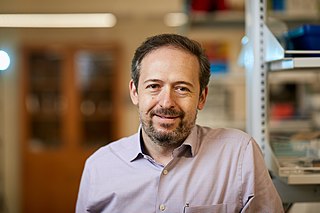
Chaim Azriel Weizmann was a Russian-born biochemist, Zionist leader and Israeli statesman who served as president of the Zionist Organization and later as the first president of Israel. He was elected on 16 February 1949, and served until his death in 1952. Weizmann was fundamental in obtaining the Balfour Declaration and later convincing the United States government to recognize the newly formed State of Israel.

The Weizmann Institute of Science is a public research university in Rehovot, Israel, established in 1934, 14 years before the State of Israel. It differs from other Israeli universities in that it offers postgraduate-only degrees in the natural and exact sciences.

Baruj Benacerraf was a Venezuelan-American immunologist, who shared the 1980 Nobel Prize in Physiology or Medicine for the "discovery of the major histocompatibility complex genes which encode cell surface protein molecules important for the immune system's distinction between self and non-self." His colleagues and shared recipients were Jean Dausset and George Davis Snell.
Ellen S. Vitetta is the director of the Cancer Immunobiology Center at the University of Texas Southwestern Medical Center in Dallas.

Ruth Arnon is an Israeli biochemist and codeveloper of the multiple sclerosis drug Copaxone. She is currently the Paul Ehrlich Professor of Immunology at the Weizmann Institute of Science, where she is researching anti-cancer and influenza vaccinations.

Michael Sela was an Israeli immunologist of Polish Jewish origin. He was the W. Garfield Weston Professor of Immunology at the Weizmann Institute of Science in Rehovot. He was a president of the Weizmann Institute of Science.

Kimishige "Kimi" Ishizaka was a Japanese immunologist who, with his wife Teruko Ishizaka, discovered the antibody class Immunoglobulin E (IgE) in 1966–1967. Their work was regarded as a major breakthrough in the understanding of allergy. He was awarded the 1973 Gairdner Foundation International Award and the 2000 Japan Prize for his work in immunology.

Philippa "Pippa" Marrack, FRS is an English immunologist and academic, based in the United States, best known for her research and discoveries pertaining to T cells. Marrack is the Ida and Cecil Green Professor and chair of the Department of Biomedical Research at National Jewish Health and a distinguished professor of immunology and microbiology at the University of Colorado Denver.
Hermann Wagner is a German scientist in the field of microbiology and immunology and past Dean of the Medical Faculty of the Technical University Munich (TUM). His massive number of published works, at over 370, makes him one of Europe's most cited immunologists.
Christopher Carl Goodnow is an immunology researcher and the current executive director of the Garvan Institute of Medical Research. He holds the Bill and Patricia Ritchie Foundation Chair and is a Conjoint Professor in the faculty of medicine at UNSW Sydney. He holds dual Australian and US citizenship.
Sir Peter Julius Lachmann was a British immunologist, specialising in the study of the complement system. He was emeritus Sheila Joan Smith Professor of Immunology at the University of Cambridge, a fellow of Christ's College, Cambridge and honorary fellow of Trinity College, Cambridge and of Imperial College. He was knighted for service to medical science in 2002.
Anat Cohen-Dayag is an Israeli businesswoman. She is president and chief executive officer of the Israeli biotechnology firm Compugen Ltd, a company involved in drug discovery. She previously worked as a scientist at the R&D department of Orgenics.

James Patrick Allison is an American immunologist and Nobel laureate who holds the position of professor and chair of immunology and executive director of immunotherapy platform at the MD Anderson Cancer Center at the University of Texas.

Tasuku Honjo is a Japanese physician-scientist and immunologist. He won the 2018 Nobel Prize in Physiology or Medicine and is best known for his identification of programmed cell death protein 1 (PD-1). He is also known for his molecular identification of cytokines: IL-4 and IL-5, as well as the discovery of activation-induced cytidine deaminase (AID) that is essential for class switch recombination and somatic hypermutation.
Zelig Eshhar is an Israeli immunologist at the Weizmann Institute of Science and the Tel Aviv Sourasky Medical Center. He was Chairman of the Department of Immunology at the Weizmann Institute twice, in the 1990s and 2000s.
Bhaskar Saha is an Indian immunologist, cell biologist and a senior scientist at National Centre for Cell Science, Pune. He is known for his contributions in the fields of immunology and cell signaling. He is an elected fellow of two of the major Indian science academies, National Academy of Sciences, India and Indian Academy of Sciences. The Council of Scientific and Industrial Research, the apex agency of the Government of India for scientific research, awarded him the Shanti Swarup Bhatnagar Prize for Science and Technology, one of the highest Indian science awards, in 2009, for his contributions to biological sciences.

Jonathan Kipnis is a neuroscientist, immunologist, and professor of pathology and immunology at the Washington University School of Medicine. His lab studies interactions between the immune system and nervous system. He is best known for his lab's discovery of meningeal lymphatic vessels in humans and mice, which has impacted research on neurodegenerative diseases such as Alzheimer's disease and multiple sclerosis, neuropsychiatric disorders, such as anxiety, and neurodevelopmental disorders such as autism and Rett syndrome.

Michal Schwartz is a professor of neuroimmunology at the Weizmann Institute of Science. She is active in the field of neurodegenerative diseases, particularly utilizing the immune system to help the brain fight terminal neurodegenerative brain diseases, such as Alzheimer's disease and dementia.

Eran Elinav is an Israeli immunologist and microbiota researcher at the Weizmann Institute of Science and the DKFZ.

Yardena Samuels or Samuels-Lev is an Israeli molecular biologist who is the Director of the Ekard Institute for Cancer Diagnosis Research at the Weizmann Institute of Science. Her research considers the genetic mutations of melanoma.












